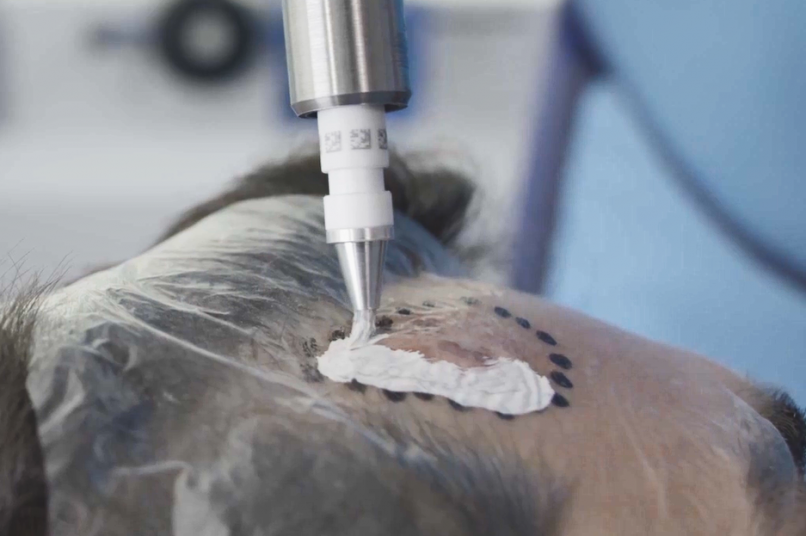Published: Tietze JK, et al. Clin Nucl Med. 2023;48(10):869–876.
MUNICH - Oct. 25, 2023 - PRLog -- Results from a recently completed study show topical rhenium-188 skin cancer therapy to be a highly effective option for treating non-melanoma skin cancer (NMSC) of up to 3 mm thickness.1
NMSCs are the most common cancers seen in the European population and their incidence are rising all over the world,2,3 with 7.7 million cases reported globally in 2017.4 In Australia, 2 in 3 people will be diagnosed with skin cancer in their lifetime and this is likely to increase as the population ages.5
Typically, treatment options for NMSCs include surgery, radiation, and cryotherapy. Surgical intervention is currently the most common treatment for invasive tumors, but it can lead to unfavorable cosmetic outcomes for some presentations.6
A team of researchers in Germany, led by dermatologist Professor Julia Tietze, and funded by OncoBeta® GmbH, Germany, investigated the efficacy and safety of topical rhenium-188 ionizing radiation therapy for the treatment of invasive NMSC.
Research lead, Professor Tietze from the University Medical Center, Rostock says, "The study found rhenium skin cancer therapy to be a highly effective treatment for NMSCs, in particular, the cosmetic outcomes on the head and face. The overall conclusion is, while surgery is the gold standard therapy for NMSCs, rhenium skin cancer therapy may be suitable for large tumors, and tumors located on sensitive areas such as nose, ear, or lips; or where surgery would be challenging."
The study involved 22 patients with 40 histologically confirmed NMSCs (57.5% basal cell carcinomas (BCCs), 12.5% cutaneous squamous cell carcinomas (cSCCs), 30% Bowen's disease lesions). Following the rhenium-188 single-session treatment, the response rate, adverse events, and cosmetic outcomes were assessed at 14 days, 4 months, and 12 months.
The key findings included:
- Response rate at 12 months was 97.5% with 95.0% complete responses (clinically or histologically proven).
- No adverse events reported during the application of rhenium-188.
- Most patients (62.5%) did not experience an adverse event during the trial period.
- Most adverse events were reported at 14 days post-treatment, with 20% of lesions itching, 12.5% were painful (mostly minor pain) and 7.5% had a burning sensation.
- The majority of treated lesions were not reported to be painful.
- At 4 months:
- Most lesions (35/40) were clinically healed.
- One lesion that only partly responded to treatment and was found to be outside the study inclusion criteria (being 3.8 mm thick).
- Beneficially, the size of that tumor was decreased by 75% which meant a reduced surgical procedure.
- At 12 months:
- Only 3/39 lesions remained potentially suspect, with one confirmed as a newly developed Bowen's disease.
- 41% of lesions were graded as either cosmetically superior to the expected result after surgery and/or as barely detectable.
- 51% of lesions were graded as comparable to successful surgery and/or as detectable but aesthetically appealing, even though 49% of the lesions showed hypopigmentation.
"Surgery for the removal of NMCSs has a high clearance rate of 95% after 5 years, however depending on the size and localization of the lesion, treatment may be painful and it may also lead to disfigurement. This study shows the efficacy of rhenium skin cancer therapy demonstrating a 97.5% response rate with 37 of the 39 lesions showing complete response at 12 months," adds Professor Tietze.
The full report and results of the study have been published in the Journal Clinical Nuclear Medicine – available to healthcare professionals via this link: https://bit.ly/Tietze2023
Study Design and Ethics Approval
Patients were eligible if they had a histologically confirmed BCC or cSCC with an area of <5 cm2 and thickness <3 mm, they were least 18 years of age and were not suitable or not willing to undergo surgery due to comorbidities, specific anatomic location or unsuccessful previous surgical procedures. Exclusion criteria included known primary melanoma near the treatment area, they were undergoing treatment for non-resectable or metastatic melanoma (including BRAF- or MEK-Kinase inhibition), they had significant impaired blood circulation in the treatment area or if they were pregnant. Patients were treated once with 188Re resin with a targeted dose of 50 Gy. The response rate (RR), adverse events (AEs) and cosmetic outcome were assessed at 14 days, 4- and 12-months post-treatment.
All procedures performed in this study were in accordance with the 1964 Helsinki declaration and its later amendments. The study was approved by the local Ethical Committee (A2020-0178). Patients signed written informed consent to participate.
About the Rhenium-SCT® (Skin Cancer Therapy)
Non-melanoma skin cancer (NMSC) is the most common form of cancer in humans.3 The most common cause of NMSC is sun exposure, while other predisposing factors include genetic skin conditions and immunosuppressive diseases or treatments.7
The Rhenium-SCT is a painless*, single session†, non-invasive‡ therapy that provides aesthetic results, even in cases otherwise considered difficult to treat8-10 The Rhenium-SCT utilizes the radioisotope Rhenium-188 in an epidermal application with optimal properties for the treatment of NMSCs. The Rhenium-SCT is a precise, personalised8,11 therapy that is only applied to the area needed to treat without affecting the healthy tissue. The specially designed device ensures the Rhenium-SCT compound never comes in direct contact with the patient's skin and the application is safe and simple for the applying physician. Most cases of NMSCs (basal cell carcinoma, squamous cell carcinoma, Bowen's disease, and Queyrate Erythroplasia) can be treated using the Rhenium-SCT in one single session.8-10† Scar-free healing of the treated lesion area and the regeneration of healthy tissue occurs usually within a few weeks after treatment.8
About OncoBeta®
OncoBeta® with its headquarters located in Garching near Munich, Germany, is a privately held medical device company, specializing in the development and commercialization of state-of-the-art, innovative therapies. Since its foundation, OncoBeta® has concentrated its efforts on the development, regulatory approval(s) and commercialization of the epidermal radioisotope therapy Rhenium-SCT® (Skin Cancer Therapy), targeting non-melanoma skin cancers and keloid scars. OncoBeta® has perfected the customized application and device management system in conformity with all health, safety, and environmental protection regulatory standards.
Find out more about the Rhenium-SCT® at www.oncobeta.com
Follow us on social media:
LinkedIn: https://www.linkedin.com/company/oncobeta-gmbh/
Facebook: https://www.facebook.com/oncobeta/
Instagram: https://www.instagram.com/oncobeta_gmbh/
Forward-looking Statements
This announcement includes forward-looking statements that involve risks, uncertainties, and other factors, many of which are outside of OncoBeta's control, and which could cause actual results to differ materially from the results discussed in the forward-looking statements. Forward-looking statements include statements concerning OncoBeta's plans, objectives, goals, future events, performance and/or other information that is not historical information. All such forward-looking statements are expressly qualified by these cautionary statements and any other cautionary statements which may accompany the forward-looking statements. OncoBeta® undertakes no obligation to publicly update or revise forward-looking statements to reflect subsequent events or circumstances after the date made, except as required by law.
*No pain reported during procedure.8,10
†Complete tumor regression in 98.5% of lesions treated.9
‡A procedure is considered non-invasive when no break or cut in the skin is created.11
References
- Tietze JK, et al. Clin Nucl Med. 2023;48(10):869–876.
- Hu W, et al. BMC Cancer. 2022;22(1):836.
- Ciążyńska M, et al. Sci Rep. 2021;11(1):4337.
- Urban K, et al. JAAD Int. 2021;2:98–108.
- Olsen CM, et al. Public Health Res Pract. 2022;32(1):3212203.
- Callan P, et al. Clinical practice guidelines for keratinocyte carcinoma: Surgical treatment. Cancer Council Australia. Last modified 25 November 2019. Available from: https://wiki.cancer.org.au/australia/Guidelines:Keratinocyte_carcinoma/Surgical_treatment (accessed September 2023).
- Cancer.net. Skin Cancer (Non-Melanoma): Risk Factors and Prevention. February 2022. https://www.cancer.net/cancer-types/skin-cancer-non-melanoma/risk-factors-and-prevention (accessed September 2023).
- Cipriani C, et al. J Dermatol Treat. 2022;33(2):969–975. Epub 22 Jul 2020.
- Cipriani C, et al. In Therapeutic Nuclear Medicine. 2014. RP Baum (Ed), New York: Springer.
- Castellucci P, et al. Eur J Nucl Med Mol Imaging. 2021;48(5):1511–1521.
- Australian Therapeutic Goods Administration. ARTG Public summary 400142.
Photos: (Click photo to enlarge)


Source: OncoBeta GmbH
Read Full Story - Latest study demonstrates high efficacy in curing invasive non-melanoma skin cancer | More news from this source
Press release distribution by PRLog

